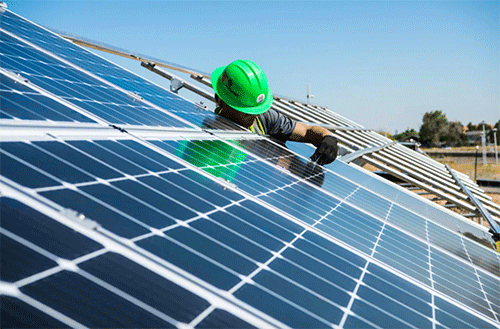As Africa undergoes an energy renaissance, it is imperative for lawmakers on the continent to prepare suitable legislation to support a just transition to boost industrialisation and eradicate poverty.
This was part of the message delivered by President Hage Geingob at the Africa Energy Week (AEW) in Cape Town. Geingob told the annual gathering that an African renaissance is at hand in renewable and non-renewable energy. This, Geingob said, will permit Africans to arrest the challenges of poverty, the protection of the planet and the industrialisation of Africa.
“We need to write complimentary policies and legislation, invest alongside one another in regional infrastructure, share research and development and re-think the utility and definition of our borders. We need one another now more than ever,” Geingob told participants at the South African Energy Indaba.
He added that for the African Energy Renaissance to be meaningful, Africa should be permitted to explore and exploit its natural endowments for the prosperity of the continent.
Said Geingob: “Access to reliable and quality energy supply is the lifeblood in the economic development of any country. Energy drives industrialisation. Energy boosts productivity and economic growth. Energy spurs human development, and it is crucial for us to reach the goals of Agenda 2063: The Africa We Want and the United Nations Sustainable Development Goals”.
This year’s AEW convened under the theme, ‘The African Energy Renaissance: Prioritising Energy Poverty, People, Planet, Industrialisation and Free Markets’.
The event, hosted by the African Energy Chamber, focuses on African energy leaders, global investors and executives from across the public and private sectors for four days of intense dialogue on the future of Africa’s energy industry.
Addressing AEW participants, Geingob lauded the theme, saying it does not only speak to a full appreciation of African energy deficits – but more importantly, it takes an optimistic outlook by challenging Africans to look at the conversation through the prism of an energy renaissance.
“Convening of policymakers and captains of industry on this scale during the Africa Energy Week, here in Africa, is a step in the right direction, as it facilitates unique platforms to dissect, learn and unlearn, while also drawing from the experiences of our counterparts for the betterment of our countries and the continent,” said Geingob.
The president added that multinational oil and energy companies operating in Africa need to demonstrate leadership in driving the transition to cleaner energy.
“Therefore, as oil majors announce major discoveries on our continent, we look forward to announcements in corresponding commitments to build clean and sustainable industrial complexes on the continent. Doing so is essential to not only respect mother nature’s thresholds for bearing our unsustainable consumptive vices, but also to ensure that our natural resources are developed in a manner that maximises benefits for the African continent”.
He continued that affordable energy for all Africans is an immediate and absolute priority.
“African countries have been working to ensure that our countries have access to energy to industrialise, grow our economies and become dealers of hope for the largest demographic on the continent – our youth,” said Geingob.
The Statistical Review of World Energy reported that in 2022, just over 85% of all electricity was generated using non-renewable sources, with coal and natural gas contributing more than half of the world’s electricity fuel sources. However, even as non-renewables remain the dominant drivers of energy access, renewables, such as wind, solar and geothermal, exhibited an extraordinary annual growth rate of 14.7%, which is in sharp contrast to non-renewables, which only managed an anaemic 0.4%. Geingob emphasised that to advance Africa’s economies and meet the plight of all, Africans will require a healthy and robust energy mix.
The President also questioned if it is contradictory for Namibia to advocate for the exploration of hydrocarbons on its shores while also pursuing a burgeoning Green and Blue Economy. “In my view, the answer is a resounding ‘no’! Not only can the two co-exist, but indeed they are wholly interdependent and complimentary. Hydrocarbons continue to power the global economic engine today, with the just energy transition expected to take several decades before many nations achieve carbon neutrality,” said Geingob.
He noted that developed nations are currently investing billions derived from hydrocarbon-fuelled industries to subsidise cutting-edge solutions to produce cleaner engines of growth.
“These subsidies and incentives, which are, of course, disproportionately deployed in developed nations, are undermining – and in some cases, totally undoing prospective business cases in emerging nations with the superior natural endowments necessary for the development of new green industries,” the President pointed out. – ebrandt@nepc.com.na


